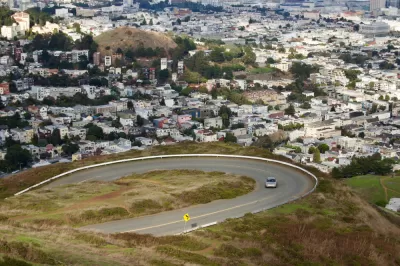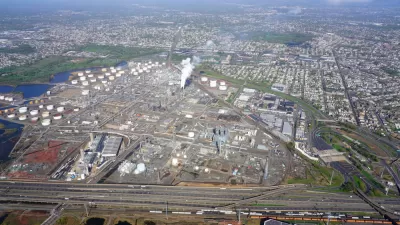Sources leaked news of the Trump Administration's plans to dismantle the Obama-era environmental policies. The Trump Administration also aims to dismantle the Golden State's ability to regulate air pollution from vehicles.

Ryan Beene , Jennifer A Dlouhy , John Lippert, and Ari Natter have a big scoop about the Trump Administration's ongoing efforts to roll back environmental regulations around the country. This time the front line is in California.
The Trump administration will seek to revoke California’s authority to regulate automobile emissions -- including its mandate for electric car sales -- in a proposed revision of Obama-era standards,
California has long been granted unique authority to set its own regulations of car pollution—a fact that has pushed car companies toward cleaner emissions throughout the history of the state's regulations given the size of its car market.
Now sources in the Trump Administration are revealing that the U.S. Environmental Protection Agency will revoke the Clean Air Act waiver that allows California its own unique authority to regulate vehicle emissions. "The U.S. National Highway Traffic Safety Administration will likewise assert that California is barred from regulating greenhouse gas emissions from autos under the 1975 law that established the first federal fuel-efficiency requirements," according to the article.
The news could be perceived as a direct attack on California's ability to determine the its own public health and environmental quality outcomes, but it could also be perceived as a direct attack on Obama Administration policies. According to the article, the Trump Administration also plans to "put the brakes on federal rules to boost fuel efficiency into the next decade." The Trump Administration will "cap federal fuel economy requirements at the 2020 level, which under federal law must be at least a 35-mile-per-gallon fleet average, rather than letting them rise to roughly 50 mpg by 2025 as envisioned in the plan left behind by Obama," according to the article.
FULL STORY: Trump to Seek Repeal of California's Smog-Fighting Power

Planetizen Federal Action Tracker
A weekly monitor of how Trump’s orders and actions are impacting planners and planning in America.

Maui's Vacation Rental Debate Turns Ugly
Verbal attacks, misinformation campaigns and fistfights plague a high-stakes debate to convert thousands of vacation rentals into long-term housing.

Restaurant Patios Were a Pandemic Win — Why Were They so Hard to Keep?
Social distancing requirements and changes in travel patterns prompted cities to pilot new uses for street and sidewalk space. Then it got complicated.

In California Battle of Housing vs. Environment, Housing Just Won
A new state law significantly limits the power of CEQA, an environmental review law that served as a powerful tool for blocking new development.

Boulder Eliminates Parking Minimums Citywide
Officials estimate the cost of building a single underground parking space at up to $100,000.

Orange County, Florida Adopts Largest US “Sprawl Repair” Code
The ‘Orange Code’ seeks to rectify decades of sprawl-inducing, car-oriented development.
Urban Design for Planners 1: Software Tools
This six-course series explores essential urban design concepts using open source software and equips planners with the tools they need to participate fully in the urban design process.
Planning for Universal Design
Learn the tools for implementing Universal Design in planning regulations.
Heyer Gruel & Associates PA
JM Goldson LLC
Custer County Colorado
City of Camden Redevelopment Agency
City of Astoria
Transportation Research & Education Center (TREC) at Portland State University
Jefferson Parish Government
Camden Redevelopment Agency
City of Claremont





























